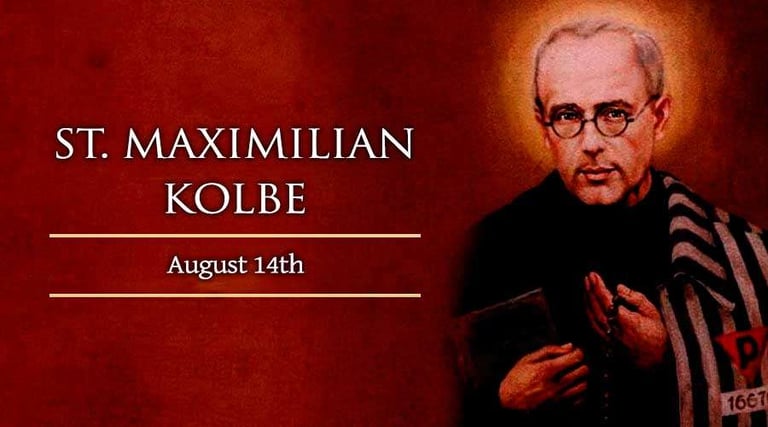Saint of the day August 14, 2025
St. Maximilian Kolbe
DAILY SAINT
Nirmala Josephine
8/14/20253 min read


Known throughout his life as the “Knight of the Immaculata,” St. Maximilian Maria Kolbe, OFM Conv., was born in Poland in 1894. When he was about ten years old, the Immaculate Virgin appeared to him and offered him two symbolic crowns: the white crown of chastity and the red crown of martyrdom. He chose them both. Maximilian entered the Franciscan Order at the age of sixteen. So intent were he and his brother, Francis, on becoming religious, that they crossed secretly in a haycart from the Russian to the Austrian partition of Poland to enter the seminary. Max was sent to the Order’s International Seraphic College in Rome for his philosophical and theological studies.
On October 16, 1917, while still a student-friar in Rome, Maximilian founded the Militia Immaculatae (MI) Catholic evangelization movement. Its purpose was to bring about the reign of the Sacred Heart of Jesus by encouraging each and every soul to make a total consecration of themselves to the Immaculate Virgin Mary. “Through the Immaculata to Jesus” was a lifelong motto. The immediate stimulus for this movement was Maximilian’s desire to counteract the militant naturalism of International Freemasonry that year. He had personally witnessed Masonic activists blaspheming under the windows of the Vatican. He was ordained a priest in 1918 and returned to Poland in 1919, with doctorates in philosophy and theology, and he had contracted tuberculosis. Nevertheless, he immediately began spreading the MI Catholic Evangelization and in January of 1922, began publishing the monthly magazine, Knight of the Immaculata.
So great and rapid was the growth of the magazine Knight, today known as Immaculata, and the community of Conventual Franciscans that formed around Kolbe, that in 1927, he founded a large apostolic center near Warsaw called Niepokalanow, the “City of the Immaculata.” Kolbe’s method of evangelization through the sponsorship of Mary was a major development of the Franciscan charism, stimulating considerable growth in the Franciscan Order itself.
While living in strictest religious poverty, the friars utilized the most modern printing equipment and administrative techniques available, enabling the Knight magazine to reach an incredible monthly circulation of one million and a daily newspaper to reach 230,000. In 1930, Father Maximilian took four brothers to Japan and founded another City there. Future plans called for a City in every nation with the Knight magazine published in every language. All forms of communication media, including radio, movies, and even television, were to be used without limit for the work of evangelization under the mantle of Mary.
Kolbe went back to Poland in 1936, for treatment of advanced Tuburculosis, and reassumed the direction of Niepokalanow – by then the largest Catholic publishing center in Poland, possibly in the world. When the Nazis overran the country in 1939, they eventually imprisoned Kolbe in the Auschwitz death camp, where in 1941, he offered to take the place of a man condemned to die in reprisal for an escaped prisoner. His offer accepted, he died two weeks later on August 14, the vigil of Mary’s Assumption. In the process, he ministered to nine others dying with him from starvation. Pope Paul VI beatified Maximilian in 1971. In 1982, St. Pope John Paul II canonized him as a “martyr of charity,” calling him “patron of our difficult century.” He is the patron saint of journalists, media communications, the famil,y and the chemically addicted.
Reflection
Saint Maximilian Mary Kolbe’s vision had come true. He first received the crown of purity and then the crown of martyrdom. His work to spread the Gospel through the Militia Immaculatae had a powerful effect upon the people of his time. His love, to lay his life down for a stranger, will live on until the end of time. Ponder the depth of love it would take to do such a thing, and pray that this same love will permeate your own life in imitation of this holy saint of God.
